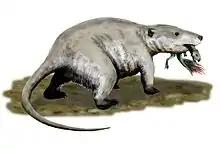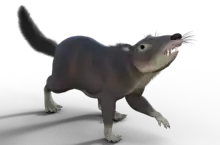Brandoniidae
Brandoniidae is a family of meridiolestidan dryolestoids indigenous to the Late Cretaceous of South America. Most are known from the Los Alamitos Formation, but also occur in other Argentinian and Brazilian sites. An Antarctic Eocene tooth is also known from Seymour Island, though it could also belong to a dryolestoid related to Necrolestes.[1]
| Brandoniidae | |
|---|---|
| Scientific classification | |
| Kingdom: | Animalia |
| Phylum: | Chordata |
| Class: | Mammalia |
| Order: | †Dryolestida |
| Clade: | †Meridiolestida |
| Family: | †Brandoniidae Bonaparte, 1992 |
| Genera | |
| |
Taxonomy
Brandoniids are consistently recovered as meridiolestidans closely related to mesungulatids and Austrotriconodon. There is a controversy in regards to how diverse the clade is, with some genera like Barberenia possibly being synonymous with Brandonia itself.[2][3]
Ecology
Unlike their larger herbivorous and carnivorous relatives, brandoniids remained insectivores (assuming they didn't secondarily revert to insectivory from herbivorous ancestors like Donodon). In particular, their teeth are compared to those of modern sengi, implying a similar gracile, cursorial anatomy.[4]
References
- http://www.aps-polar.org/paper/2019/30/03/A190814000002/full
- Laura Chornogubsky, New remains of the dryolestoid mammal Leonardus cuspidatus from the Los Alamitos Formation (Late Cretaceous, Argentina), Article in Paläontologische Zeitschrift 85(3):343-350 · September 2011 doi:10.1007/s12542-010-0095-4
- Analia M Forasiepi Rodolfo A. Coria Rodolfo A. Coria Jørn Hurum Philip J. Currie Philip J. Currie, First Dryolestoid (Mammalia, Dryolestoidea, Meridiolestida) from the Coniacian of Patagonia and New Evidence on their Early Radiation in South America, December 2012 AMEGHINIANA 49(4):497–504 doi:10.5710/AMGH.8.8.2012.581
- Guillermo W. Rougier, Laura Chornogubsky, Silvio Casadio, Natalia Paéz Arangoa, Andres Giallombardo, Mammals from the Allen Formation, Late Cretaceous, Argentina, Cretaceous Research Volume 30, Issue 1, February 2009, Pages 223–238, https://doi.org/10.1016/j.cretres.2008.07.006





